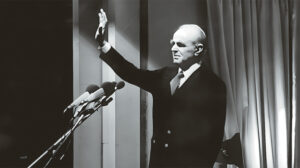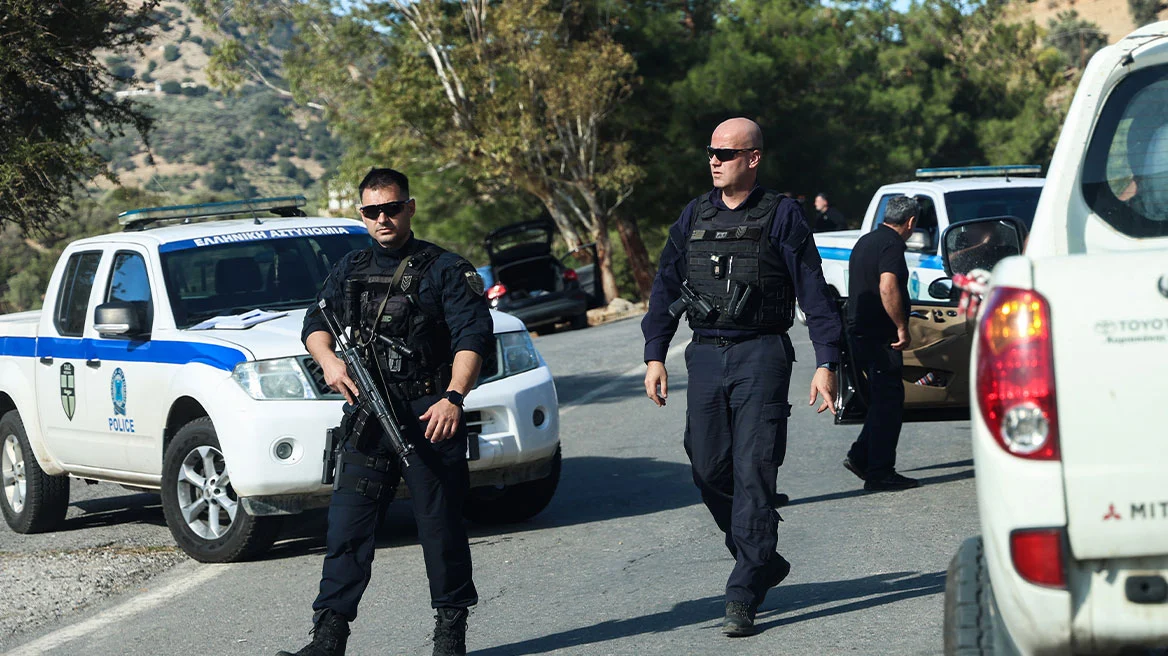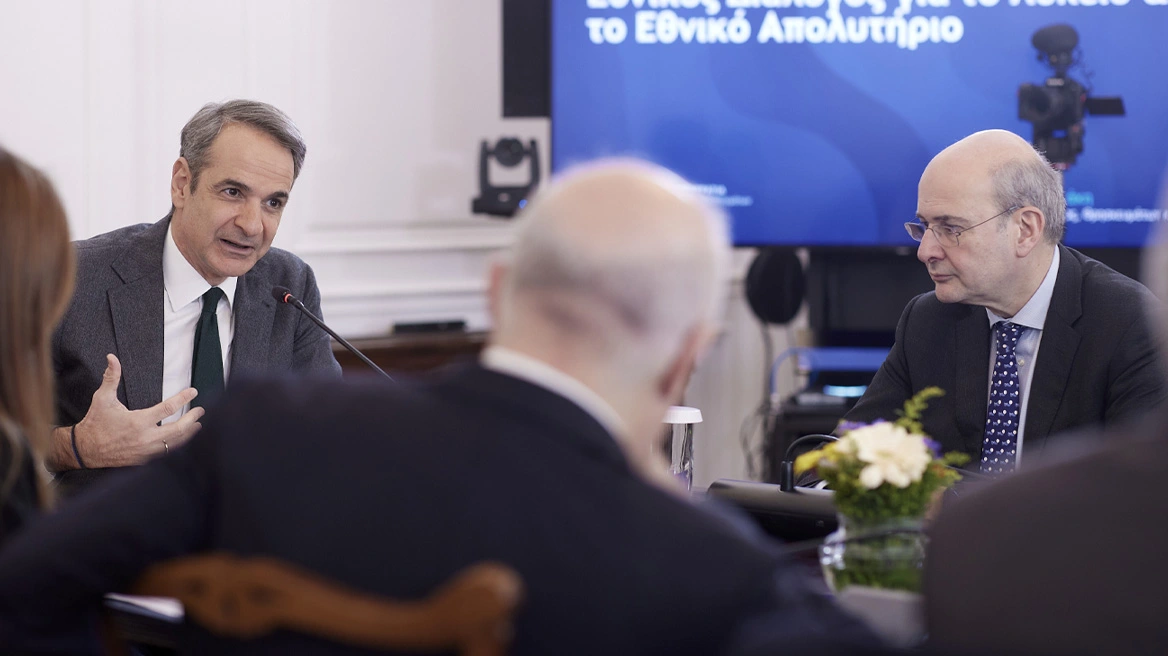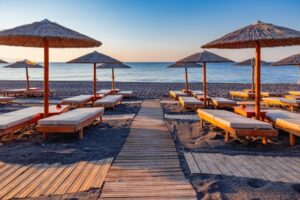It has been 50 years since the founding declaration of New Democracy on October 4, 1974. The declaration was signed solely by Konstantinos Karamanlis, just two and a half months after his return to Greece, following 11 years of self-imposed “exile” in Paris. Thus, the party was established, which, along with PASOK, became the two main pillars of the post-dictatorial Greek Republic. New Democracy has governed for 24 years, including the present, while PASOK has governed for 22 years, and the SYRIZA interlude lasted 4 years. Over these 50 years, New Democracy has proven to be more resilient, consistently finishing first or second in all elections, either as the government or the main opposition, in contrast to PASOK, which, after the financial crisis, retains marginal strength compared to its past.
The founding document of New Democracy, brief and concise, stated among other things:
- “New Democracy is the political movement that ignores the conflicts and divisions of the past – which have caused so much suffering to our country – and focuses on the broadest possible forms of national unity.”
- “New Democracy promises that it will always serve only the true interests of the nation, which lie beyond and above the misleading labels of Right, Center, and Left.”
- “New Democracy promises that the free economy it believes in cannot exclude the expansion of the economic sector controlled by the state. And private initiative cannot find its justification without the parallel participation of the broader working classes in the distribution of national wealth.”
- “New Democracy will spare no effort or sacrifice to make Greece strong and invulnerable… And it will be respected by all, without the need for other protectors apart from the collective organizations in which it will participate of its own free will and in line with the permanent interests of Hellenism.”
- “New Democracy promises that it will fight for the full and universal safeguarding of popular sovereignty and will seek to adapt the political system to the conditions of Greek reality to achieve this.”
- “New Democracy believes that Greece not only deserves but can secure a prominent position and the happiness of its people within Europe, to which it belongs… and can contribute politically, morally, and culturally to the realization of the idea of a united Europe.”

It is evident from this declaration what Karamanlis primarily aimed for, why he founded a new party, and why he did not simply reestablish the pre-dictatorship National Radical Union (ERE):
- First, he sought a fresh start, away from the divisions of the past and the post-civil war, pre-dictatorship constitutional monarchy.
- Second, he wanted Greece’s politically, economically, and militarily satellite-like role under the United States not to continue, and for the country’s future to be increasingly oriented towards Europe.
- Third, he intended to adapt the political system to the realities of the time, clearly implying the abolition of the monarchy.
- Fourth, he aimed to set limits between political power and large economic interests, making the state’s interventionist role clear, as well as the expansion of the economic sector under state control, wherever private initiative acted contrary to public interest.
In reality, these declarations were largely implemented by Konstantinos Karamanlis. During his tenure, New Democracy abolished all post-civil war measures and the division of citizens into “nationally loyal” and “outcasts,” legalized all political parties, and drafted a progressive, democratic Constitution. He integrated Greece into the forefront of European countries, significantly reducing the country’s dependence on stifling American influence. Karamanlis himself played a key role in the abolition of the monarchy, eliminated the long-standing interventionist role of the armed forces in politics by confining them for the first time exclusively to their institutional role, and brought several unregulated large private enterprises under full state control through nationalizations. For this, he was accused by affected major business figures and the Industrialists’ Association of “socialism.”
Moreover, he established a moderate political climate that allowed the significant strides towards modernizing the political and economic conditions of that era. These strides were continued in many areas by the subsequent PASOK governments, particularly in the health sector with the creation of the National Health System (ESY), the modernization of family law, the strengthening of social protection institutions, the fairer distribution of national income, and the political, economic, and social advancement of social classes that had previously been marginalized or entirely excluded from developments.

In this way, albeit with their negative aspects, which are not the focus at present, the pages of the first decade of the post-dictatorship era have been recorded—perhaps the most productive, effective, and significant decade in modern Greek history, though it unfortunately did not always have a corresponding continuation. However, the foundations laid during that time averted the complete destruction of Greece during the major political, economic, and social crisis of 1909–1919.
When Konstantinos Karamanlis resigned as Prime Minister and assumed the Presidency of the Republic, he was succeeded as Prime Minister by Georgios Rallis. Rallis, undermined by Evangelos Averoff and his supporters within the party and parliamentary group, lost the 1981 elections. Averoff succeeded Rallis but resigned in 1984 due to health reasons.
Evangelos Averoff was succeeded by Konstantinos Mitsotakis, who served as Prime Minister from 1990 to 1993. Mitsotakis was followed by Miltiadis Evert, who served as party leader from 1993 to 1997. From 1997 to 2009, Kostas Karamanlis was elected president of the party, serving as Prime Minister from 2004 to 2009. Antonis Samaras succeeded Karamanlis, serving as party leader from 2009 to 2015 and as Prime Minister from 2012 to 2015. Since then, and up to the present, the president of New Democracy and Prime Minister since 2019 is Kyriakos Mitsotakis.

In summary, and with the risk inherent in oversimplifications, one could observe the following about each of Konstantinos Karamanlis’ successors:
- Georgios Rallis aimed to maintain a moderate political climate and give New Democracy a centrist-right profile.
- Evangelos Averoff steered the party towards a more conservative right and nationalist populism, often employing aggressive tactics against PASOK both inside and outside Parliament.
- Konstantinos Mitsotakis shifted New Democracy towards the center politically and pursued a liberal economic agenda, promoting significant privatizations despite major resistance.
- Miltiadis Evert completely rejected economic liberalism, advocated for state interventionism, and attempted to restore a populist right-wing stance.
- Kostas Karamanlis moved the party towards the center, targeting the middle ground, and operated with a mix of centrist and populist right policies. He generally avoided major decisions, even when it became evident that the economy was derailing and the country was heading toward disaster.
- Antonis Samaras, a political disciple of Averoff, began as an opposition leader with extreme anti-austerity rhetoric but governed responsibly and effectively as a pro-austerity prime minister. He pushed the party as far right as possible, embracing nationalist populism and opening the doors to prominent far-right figures.
- Kyriakos Mitsotakis, in contrast, follows a liberal and modernizing economic policy with centrist characteristics in the social and political realms, as much as the internal resistance of the party’s populist right allows.
Konstantinos Karamanlis
I frequently met Konstantinos Karamanlis in various capacities—as Prime Minister, as President of the Republic, and as a private citizen during the brief periods when he was not holding public office. In my role as a political correspondent, columnist, and newspaper editor—fields he was particularly interested in because their readership mostly consisted of non-New Democracy voters—I had frequent communication with him, always at his initiative. We met either privately in his office or, during weekends, with other colleagues at locations such as Varympopi, at Leonidas’ place, at the Golf, or Psaropoulos in Glyfada, or in Dionysos, opposite the Acropolis. He was very careful and measured in his words as Prime Minister but spoke much more freely as President of the Republic. He was even more candid in our private conversations without a third party present.
Considering that much has already been written about Karamanlis and his work by others, I will limit myself here to sharing some discussions we had, which I noted down at the time, as I believe they offer insights into his personality and political thinking.
On an official trip to India and Australia during his presidency, in which I participated as a correspondent for To Vima, he called me over mid-flight to sit next to him and started asking me about various issues related to the press. At one point, I said, “You, Mr. President, as the leader of the Right…” and before I could finish the sentence, he interrupted sharply: “What Right are you talking about? Am I the Right-winger? And who are the Leftists? Wasn’t it I who, as soon as I took over after the Civil War, stopped the executions and opened the prisons and exile camps? Wasn’t it the centrists who made Law 509, all the anti-communist legislation, the political loyalty declarations, the prisons, the exiles, and the executions? I took office just six years after the Civil War ended. And immediately, I found myself in the middle. On one side were my own people, the right-wingers, who wanted us to crush the communists, and on the other side were the communists, who refused to accept their defeat. So, gradually, I released them from prison; I didn’t carry out any executions, and I safeguarded the democracy of that time. So, I am the right-winger, and they are the democrats, who did all these things, which I found ready-made?
And didn’t I also legalize the Communist Party after the dictatorship? Didn’t I withdraw from NATO when it was necessary? Didn’t I nationalize the companies of Andreadis, Onassis, and Niarchos? Didn’t I achieve the smooth and bloodless transition from dictatorship to democracy? Didn’t I contribute decisively to the abolition of the monarchy? Didn’t I guarantee the alternation of parties in power? Didn’t I draft the best Constitution Greece ever had? So what are you telling me now about being the leader of the Right? You all need to understand that the time has come to move away from slogans and labels, and for the parties to stop trapping people in rhetoric, in which they then become entangled themselves.”
This insight into Karamanlis’ mindset reflects his vision of transcending partisan divides and labels, focusing instead on national unity and practical governance.

The world is ready to accept the truth if you explain it to them. But we constantly get lost in carelessness and demagoguery and then blame others. We believe that everything happens either in our favor or against us, and that everyone in the world is either Philhellenic or anti-Hellenic. We see conspiracies everywhere. And we constantly overlook our own mistakes and forget the fundamental principle: In politics, you can’t improvise, move randomly, and not know where you’re heading. And let me tell you something else: You should never push things to the extreme. You must always leave your opponents dignified escape routes. And you must never lead people to despair. When you leave them with nothing to hope for, when they have nothing left to lose and their existence is threatened, then their reaction can become very harsh, violent, revolutionary.
After leaving Delhi, following Karamanlis’ talks with Indira Gandhi, we traveled to Madras, the second stop of the official visit. That first evening, the governor of Madras hosted a grand reception in the vast gardens of the governor’s mansion, a magnificent colonial-style building. The gardens were lit by torches held by turbaned Indian servants, and everywhere there were huge tables overflowing with an impressive abundance of expensive delicacies. At one point, I glanced around and saw dozens of half-naked children perched on the gilded high railings of the gardens, gazing longingly at the buffets and the silver trays of lavish foods being carried by servants among the guests. At one moment, I found myself next to Karamanlis and caught his gaze fixed on this sorrowful scene. He didn’t say a word.

We left the governor’s mansion in Madras not with the best impressions because of that situation. The next day, Karamanlis was scheduled to have talks with the governor of Madras, and in the evening, we were supposed to attend a traditional theatrical performance held specifically for us. We were set to depart for Australia the day after. But early in the morning, after the governor’s evening reception, while we were having breakfast at the hotel, Petros Molyviatis suddenly appeared, hurriedly telling us to get ready quickly as we were leaving India immediately. Indeed, we boarded the plane swiftly and landed in Singapore, where we stayed for an entire day to bridge the time until the next, when we were expected in Australia for the official visit to begin. At the hotel in Singapore, where we were unexpectedly hosted, we saw English-language Indian newspapers that severely criticized and insulted Karamanlis for the unjustified and offensive early termination of his visit to India, especially since a theatrical performance had been prepared for him.
When we arrived in Singapore, I asked Karamanlis why we had left Madras so suddenly and without warning. His answer was disarming:
“I couldn’t bear seeing such terrible misery any longer. I couldn’t stand seeing those hungry little children clinging to the railings, while inside, there were enormous tables and silver platters with vast amounts of expensive food. These past days, we have lived in India surrounded by extreme luxury, while around and beside us, we saw the most extreme poverty. The Indian people are patient, but how long can they endure such provocations? And I am neither patient nor used to tolerating provocations.”
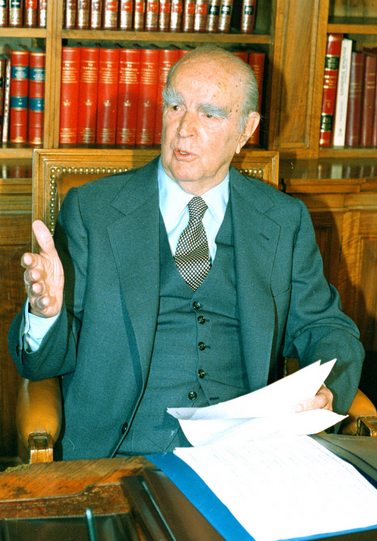
I met with Karamanlis more frequently than usual during his second presidential term from 1990 to 1995 when I was initially a political columnist and later the editor of Kathimerini, a newspaper for which he was particularly interested in its publications.
It was a turbulent time with the successive elections of 1989-1990 and the Special Courts, and he was particularly anxious about the developments. He was categorically opposed to the left-right coalition governments of that time, especially the referral of Andreas Papandreou to the Special Court, highlighting the reactions this provoked. He maintained clear distances from the decisions of the then Prime Minister, Kostas Mitsotakis. The content of one of our related conversations is telling:
“Things happened that shouldn’t have happened with these strange coalition governments of Tzanetakis and Zolotas. Nonsense took place. The false situations are not remedied with false solutions. I told Mitsotakis to go immediately to new elections at that time. He shouldn’t be doing all these acrobatics. He didn’t listen to me. And now, here are the results. What is happening with the trials is disgusting. These stories are not proven. They are sitting there listening to Koskotas, a fraudster. They started a story with these trials, and now they don’t know what to do with it. I never speak against the Prime Minister, but these things are nonsense.
Mitsotakis now tells me that Papandreou will either be acquitted due to doubts or will be convicted with a suspended sentence. And I replied to him, how do you know what the decision will be? And even if you do know, why are you talking about it? Are such things said? They haven’t predicted anything. They don’t know where they are going. They are doing random things and wherever this leads them. Now, since they have started the trials, they need to finish them quickly. By any means. Otherwise, they will be ridiculed. Mitsotakis comes here; I express my opinion, I advise him. And so what? He does whatever he wants. He writes me off. Since I have no authority after Papandreou’s constitutional revision, how can I force him to listen to me?”
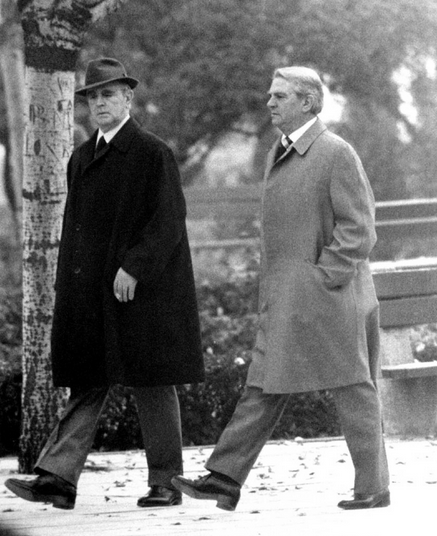
Karamanlis was particularly anxious about the atmosphere of unrest, strikes, issues surrounding privatizations, and street clashes that prevailed during those days of May 1991.
He called me again to the Presidential Palace, visibly upset about the situations that had arisen, and emphasized:
“The neoliberalism of Mitsotakis does not hold. If you lose the middle class, what remains? In times of crisis like this, social justice is needed above all. The poor cannot pay while the rich mock them. There also needs to be social austerity. Wealth cannot provoke such days. Receptions, conferences, trips, nonsense… Expenses here and there. If you are asking others for sacrifices, you must first set an example yourself. And mainly, you must not provoke.
Our primary goal must be economic reconstruction; otherwise, disintegration will come. This will be a difficult task, as the greatest harm done in recent years has been the corruption of the Greeks and the erosion, the disintegration of society. We will pay dearly for this for many years. And I worry a lot because a deeper distortion of the regime has occurred. A few, very few people have acquired immense and unchecked power; they have infiltrated everywhere and do whatever they want, without considering anyone or anything. Where will this lead?”
Konstantinos Karamanlis withdrew from active politics in 1995 when he completed his second presidential term, but he always remained interested in political developments. Initially, I often saw him at his home in Politia, but it was evident that his health was deteriorating rapidly. Soon, proud as always, he stopped meeting people outside his very close circle to prevent us from witnessing his physical collapse. Until the end, he would always call me on my nameday to wish me well. He could no longer speak clearly, only articulating vowels, and I limited myself to saying “thank you, Mr. President,” without being able to understand exactly what he was saying during those very brief phone calls.
He died in 1998 at the age of 91, having had an unprecedented political career for a Greek politician: Minister for 8 years, Prime Minister for 14, President of the Republic for 10. Unlike other great Greek politicians, such as Charilaos Trikoupis or Eleftherios Venizelos, he died quietly and gloriously, honored not only by friends but also by opponents.
GEORGIOS RALLIS
Georgios Rallis succeeded Konstantinos Karamanlis as president of the New Democracy party and Prime Minister in May 1980, narrowly defeating the other contender for leadership, Evangelos Averoff. Rallis’ election by the parliamentary group of New Democracy created significant internal problems for the party, as Averoff and his supporters—members of parliament and party officials—never reconciled with their defeat. Problems arose centered around the undermining of Rallis by any means possible, which continued and gradually intensified until the 1981 elections and the sweeping victory of PASOK.
The election of the new president of New Democracy took place on May 8, 1980, in the Senate Hall of the Parliament. Rallis received 88 votes, Averoff 84, and 3 votes were blank. When entering the room before the voting, Averoff was confident that he would be the winner with a majority of over 100 votes, as he believed himself and his collaborators spread this belief. This number arose from assurances and promises given to Averoff by MPs he had met and gauged. Averoff had a clear lead among the officials of New Democracy’s party machinery as well.
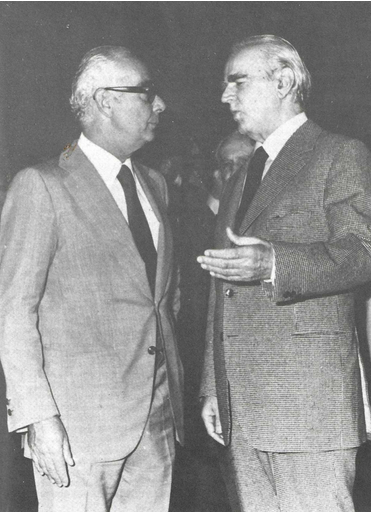
The same atmosphere of support for Averoff prevailed among the organized grassroots of the party. In fact, Konstantinos Karamanlis was absolutely certain that Averoff would be the winner and had indirectly tried to dissuade Rallis from running for the position. Therefore, when the result was announced, Evangelos Averoff and his supporters could not believe what they heard and saw. They immediately attributed their loss to behind-the-scenes interventions on behalf of Rallis. Not coincidentally, Karamanlis had foreseen that “these two would eat each other alive.” And so it happened from the very first day. Both Averoff himself and his key collaborators began to support the theory that there had been a massive phone intervention from Konstantinos Karamanlis in favor of Georgios Rallis the night before the vote.
They even added that these calls had been made by Karamanlis’ brother, Achilleas Karamanlis. Thus, while it had been agreed before the vote in a meeting between the two candidates, Karamanlis, and Konstantinos Papakonstantinou that the loser would assume the role of vice president of the party, take a ministry of their choice, and participate in decisions regarding the composition of the new government, Averoff did not attend the scheduled meeting set for the day after the election. He refused to take on the vice presidency, backing out of the agreement, and stated that he would remain in the government only as Minister of Defense. Two individuals were then very close to Evangelos Averoff and significantly and perhaps detrimentally influenced his moves before and after the election: the newly elected MP Antonis Samaras and the political journalist of To Vima, Stavros Psycharis.
Following Rallis’ election and during his 17-month tenure as Prime Minister and party president, factionalism within New Democracy intensified, and conflicts among MPs, ministers, and party officials aligned with each side became sharper. Mutual suspicion, animosity, and general confusion also increased at both the level of the parliamentary group and the party machinery.
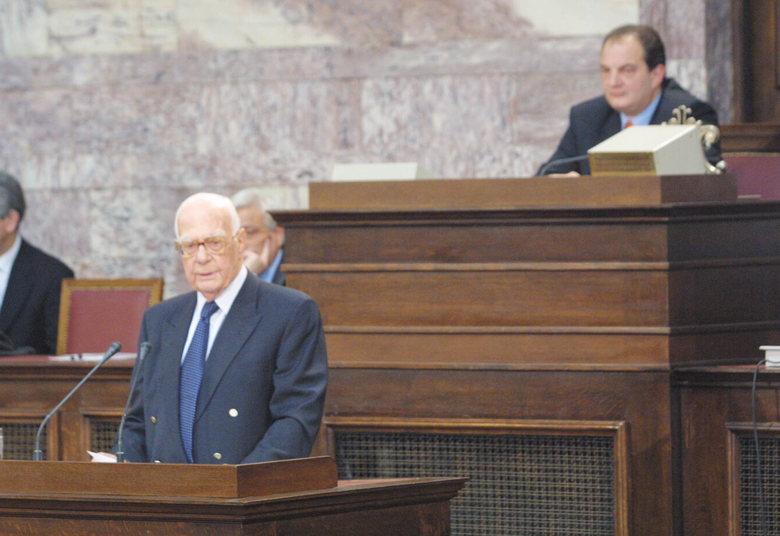
Under these circumstances, Rallis approached the elections of October 1981 with a fragmented party, characterized by mutual suspicion among its members, while PASOK and Andreas Papandreou surged toward power.
As a political reporter for To Vima, I attended many of the political leaders’ rallies across Greece during those elections. It was clear what would happen at the polls. Large and enthusiastic crowds flocked to Papandreou’s rallies by any means possible, even arriving on tractors from the most distant villages to the squares of the cities. The squares were overflowing, the crowds were delirious, and the excitement was indescribable.
Everyone celebrated in advance the upcoming victory. These rallies were more a massive outpouring, a wild celebration, and less political events. On the other hand, at Rallis’ rallies, the squares were either half-empty or half-full. The buses sent to transport supporters of New Democracy also arrived either half-empty or half-full. Rallis’ supporters claimed that the local mechanisms loyal to Averoff were preventing the attendance of supporters at their rallies. Conversely, Averoff’s supporters maintained that the base of New Democracy wanted neither to see nor to hear Rallis.
The atmosphere was tense, with divisions and discontent palpable within the party. The contrast between the exuberance of PASOK’s gatherings and the lackluster turnout at Rallis’ events highlighted the uphill battle the New Democracy party faced. As the elections approached, it became increasingly apparent that the political landscape was shifting dramatically, setting the stage for a significant change in Greece’s governance.

After the electoral defeat, George Rallis raised the issue of confidence within the parliamentary group, as if he wanted to rid himself as soon as possible of a party that had undermined him from the start. Thus, on December 7, 1981, in the parliamentary group vote, 61 deputies voted against Rallis, 41 in favor, and 9 abstained.
Karamanlis had tried to persuade Rallis to wait for the developments and not to raise the confidence issue immediately, but his advice was ignored. I met Rallis a few days later, in good spirits on Valaroti Street, and we walked together, discussing for quite a while. Among other things, I asked him why he hurried to raise the confidence issue himself and didn’t wait a bit to better weigh the post-election circumstances. His response was disarming and characteristic of George Rallis:
“I have never made a fool of myself for the women I loved, so why should I be a fool for these clowns who have doubted and undermined me from the very beginning?”
Coming from the deep right, Rallis had gradually evolved into a centrist politician with mild tones. He was courteous, honest, dignified, straightforward, and sincere. He was successful and effective in all the ministries he held before and after the dictatorship, with one of his most significant achievements as Minister of Education being the educational reform of 1976-1977. This reform established compulsory nine-year education and made the demotic Greek the official language of education and public administration.
His commitment to education and social issues reflected a broader vision for the country, aiming to modernize and democratize the Greek political landscape. However, his leadership faced significant challenges within his own party, compounded by the political dynamics of the time. The rift between the factions within New Democracy hindered its ability to regroup and respond effectively to the rising influence of PASOK and Andreas Papandreou, who were poised to transform the Greek political scene.

He tried to impose a mild political climate during a turbulent time and to maintain decorous tones in political debates. However, those years of polarization and confrontational clashes may not have been suitable for politicians of the type and caliber of George Rallis. It is not at all coincidental that Andreas Papandreou himself, as he confided to me, held him in high regard for his ethics, kindness, and political decorum.
EVANGELOS AVEROFF
Evangelos Averoff succeeded George Rallis as the leader of New Democracy, taking on the role of the leader of the opposition against Andreas Papandreou’s government. From the very first days, it became clear that New Democracy was turning a page. It abandoned the mild political climate that had been the main direction of Konstantinos Karamanlis and George Rallis, directing the party, both at the level of the parliamentary group and the party machinery, toward a harsh and extreme aggressive policy against the government and the leftist parties. It is no coincidence that Averoff had stated that the ideological and political principle of the party is “national democratic liberalism,” replacing the previously declared identity of “radical liberalism” from the time of Konstantinos Karamanlis.
The curious aspect of this history is that George Rallis, coming from the hard right, acted as a centrist politician and gathered around him the more moderate and reformist elements of the party, while Evangelos Averoff, coming from the Liberal Party and having served as a minister in the Sofoulis and Plastiras governments, adopted the reasoning of populist right-wing, and traditional elements of the deep Right found themselves among his central collaborators. This political logic and direction became the main characteristic of Averoff as a leader and of New Democracy overall during his time.
Thus, under Averoff, New Democracy officially participated in events in Grammos and Vitsi, officially attended events at Syntagma and Makrygianni, voted against the recognition of the National Resistance, and maintained a sharply negative opposition to all PASOK choices both in and out of Parliament. The primary concern of the new president upon taking office was the organizational restructuring and reshaping of the party.

Dozens of new local organizations were created, including employer and labor unions, women’s organizations, student organizations, scientific associations, sectoral organizations, and agricultural associations. Special emphasis was placed on the party’s youth, ONNED, whose members grew from 5,000 in 1981 to over 120,000 in 1984. In fact, this youth proved to be extremely dynamic, even to the point of extremism, as they played a leading role in incidents on the streets, and two militant groups emerged from their ranks, the Centaurs and the Rangers, which often operated in deplorable ways on the edge of legality.
However, it is a fact that under Averoff, the previously non-existent organizational foundations of the party were laid for the first time. But they did not yield the expected results. Just as the dynamic, combative opposition to PASOK did not produce the expected outcomes. Although it did rally the already existing grassroots support of the party, it did not expand it.
On the contrary, it triggered an anti-right aggressive counter-mobilization across the entire political spectrum except for New Democracy. All of this was evident in the 1984 European elections, where Averoff aimed to secure first place. However, he lost by more than 3 percentage points. Two months later, in August 1984, he resigned. Prior to this, the first intense internal party attacks against him had begun, amid a significant climate of questioning regarding his ineffective and extreme ideological-political choices. By then, new groupings had emerged, and for the first time, Kostas Mitsotakis was recorded as a group leader and a potential successor.

It is certain that this last political period of Evangelos Averoff does not do justice to his overall presence in the public life of Greece, in my opinion. His personal contribution as Minister of Defense to the smooth transition from dictatorship to democracy was significant, as was his literary work and his contribution through the Averoff Tositsa Foundation to the cultural promotion and economic prosperity of Metsovo.
Finally, it should be noted that when handing over the party to Kostas Mitsotakis, he had sold parts of his real estate and had paid off all of New Democracy’s obligations, delivering for the first and last time in the party’s history a treasury without a single drachma in debt. In my personal interactions with him, I formed the image of a very polite, dignified, and intelligent man, who believed in what he said and in the idea of “national consciousness,” as he understood it, and who was rightly characterized by both friends and opponents as a true “gentleman.”
KOSTAS MITSOTAKIS
Kostas Mitsotakis succeeded Evangelos Averoff as the leader of New Democracy, elected in September 1984 with 71 votes against 40 for his opponent Konstantinos Stefanopoulos. This was, at first glance, an impressive political phenomenon. Mitsotakis came from the Center Union and was indeed the driving force behind the “uncompromising struggle” against the National Radical Union (ERE) and Karamanlis personally before the dictatorship. From that time, he was also labeled a “defector,” as he had been one of the main actors in the overthrow of Georgios Papandreou’s government in 1965.
In the post-junta period, Karamanlis did not include him in the composition of the National Unity government, nor in the New Democracy lists in the 1974 and 1977 elections, in which Mitsotakis was elected with the personal party of the Liberal Democrats that he had founded. He joined New Democracy in 1978 and then dissolved his failing party. Just six years later, in 1984, he was elected its leader, having previously faced political adventures and disasters with remarkable composure, from which few politicians would have managed to survive.
In his election as leader of ND, he was supported by MPs from various backgrounds, but his main supporters, who ultimately gave him victory, were Evangelos Averoff and the solid group of MPs who followed him.
Kostis Stefanopoulos was primarily supported by the group of younger reformist MPs, the staunch Karamanlites, as well as Georgios Rallis and the group of MPs who belonged to his political environment. However, the large majority of MPs that Kostas Mitsotakis gathered was primarily motivated by the view, which was not far from reality, that he was the most suitable to dynamically confront Andreas Papandreou. He would become the “anti-Andreas” of New Democracy, a role that the moderate and supporter of a mild political climate, Kostis Stefanopoulos, could not play either by nature or by character.

It is clear that Mitsotakis never gained a homogeneous party base in the party of which he was elected leader. He constantly had to balance between the traditional far-right supporters of Averoff, the reformist centrists of Rallis and Stefanopoulos, and the staunch Karamanlis’s followers, who considered him a foreign body in the faction.
Nothing was more difficult than these balances, as he faced intense questioning from internal opponents from the very beginning. This questioning became much more pronounced when he lost the elections of 1985, a fact that initially forced him to resign and later to run again for the leadership. He won that battle, but it had the collateral damage of Stefanopoulos’s departure from New Democracy, along with 9 other MPs, who founded the DIANA party. This new center-right formation was followed by several New Democracy officials throughout Greece.
Under these circumstances in New Democracy, with Andreas Papandreou gravely ill and scandals tearing apart PASOK, the most significant being the Kotskotas affair, three successive elections were held in 1989-1990 under the simple proportional representation law, resulting in three consecutive electoral victories for New Democracy with high percentages that, due to the electoral law, did not provide parliamentary majorities. From these elections emerged initially the coalition governments of Tzanetakis and Zolotas, and finally the government of Konstantinos Mitsotakis, with a slim majority of just two seats, one “borrowed” from DIANA and one won in the Electoral Court. All this occurred in an atmosphere of extreme polarization, which had led to uncontrolled situations, partly due to the referral of Andreas Papandreou and his associates to the Special Courts.

With these broader difficult correlations, Kostas Mitsotakis tried to implement the policy of liberal reforms he believed in: the policy of economic liberalism, limiting the state, structural changes in the public sector, privatizations, liberalizing labor relations and capital movement, and reducing administrative restrictions on the economy. Almost all of these measures were contrary to the political demands of the traditional popular right within New Democracy. But they also met fierce resistance from PASOK, which had mobilized its supporters in the streets due to Papandreou’s referral to the Special Court.
Mitsotakis faced fierce opposition not only from the affected trade unions but also from powerful economic interests among public suppliers, who directly or indirectly controlled significant media outlets and lost their access, connections, and usual practices for exploiting public enterprises due to the privatizations.
Amidst all this, the collapse of the communist regimes in Europe and the disintegration of Yugoslavia unfolded, resulting in the issue of naming the new state of North Macedonia, which, entirely irrationally, became a central issue of Greek foreign policy. On this absurdity concerning the name, Mitsotakis’s government was overthrown by former Foreign Minister Antonis Samaras and two of his MP friends.
Samaras had been dismissed from the Foreign Ministry by Mitsotakis in April 1992 due to his disagreement over the handling of the Skopje issue. He resigned from New Democracy and founded his own short-lived party, the Political Spring, with right-wing ethnoliberal orientations. Thus, Mitsotakis’s government fell, and the elections of October 1993 were announced, which restored PASOK to power under Andreas Papandreou, who was gravely ill but vindicated by the Special Court.
The Kostas Mitsotakis I knew was, on a personal level, a sympathetic, polite man open to dialogue, often brutally honest for a politician. He never lost his legendary calm, was generally optimistic, an excellent parliamentarian, and always well-read on the topics he spoke on as Prime Minister, Minister, or ordinary MP.

He was a politician with undeniably remarkable leadership qualities as well as political endurance, which are necessary in this “profession.” I have the impression that he almost always made the right diagnoses, such as, for example, before the dictatorship, he saw the impending dictatorship and tried to prevent the Papandreou – Konstantinos conflict or later to limit its consequences, or when as prime minister he foresaw the upcoming economic collapse that ultimately led to the memorandums, and he tried to address it in time. However, perhaps by making the right diagnoses, he continued with wrong moves that simultaneously opened many large fronts that were difficult to manage.
Thus, he simultaneously opened fronts with the indictment of Papandreou, with all the syndicalist unions in both the public and private sectors, and with many major businessmen who owned and influenced media outlets. With a majority of just two seats and a party largely hostile to him, the overthrow of Konstantinos Mitsotakis was perhaps predestined. Nevertheless, I believe that had he remained prime minister and managed to implement his program, the crisis of 2009 – 2019 would likely not have had either this extent or this depth. Not coincidentally, most of Mitsotakis’s planned reforms timidly appeared in the subsequent governments of Andreas Papandreou and Kostas Simitis and were ultimately violently imposed on Greek society as mandates from the memorandums and the lenders.
MILTIADIS EVERT
Miltiadis Evert succeeded Konstantinos Mitsotakis in the leadership of the party, prevailing over Giannis Varvitsiotis with 141 votes to 37. In this election, Konstantinos Mitsotakis neither intervened nor tried to intervene, remaining strictly neutral. However, from the results, it seems that Everett was supported not only by the Karamanlis bloc and the reformist MPs but also by many members of Mitsotakis’s team. This is despite the fact that he had led the internal opposition along with Stavros Dimas and Athanasios Kanellopoulos and had also resigned from the Presidency in October 1991, disagreeing with Mitsotakis’s central choices.
Despite the support he likely received from Mitsotakis’s team members, Evert, as soon as he took over, began to purge the party of supporters of the former prime minister while simultaneously demolishing the core principles of his policies, from the handling of the Macedonian issue to privatizations, labor relations, stabilizing programs, and social security, labeling them as extremely neoliberal. And then began an unrelenting internal party war between the two sides, which lasted continuously until the fall of Miltiadis Evert in March 1997.
Evert, a classic representative of the popular right and a political offspring of Konstantinos Karamanlis, as he characterized himself, was a Europeanist, believed in state interventionism, national reconciliation, and chose his collaborators regardless of their political origins. A notable aspect is that one of his major achievements as mayor of Athens was the establishment of the first free, non-state radio station, Athens 9.84, most of whose journalistic staff and administrative officials came primarily from the moderate Left and certainly not from the New Democracy Right.
He was a straightforward, open, spontaneous person, loyal to his friends, active, and impulsive to the point of being reckless, which earned him the nickname “bulldozer.” Despite his bourgeois origins, he was someone who could communicate and connect more effectively and better with people from the lower classes than with individuals from his own social class.
Throughout 1995, Evert was steadily moving toward a significant electoral victory, facing the semi-moribund Andreas Papandreou and his indescribable entourage. All the polls of that time gave him a safe lead over PASOK of more than three points. Evert’s great opportunity came in early 1995 when it seemed that the Parliament was about to dissolve due to the inability to elect a President of the Republic, resulting in early elections that he would easily win.
Then the president of POLAN, Antonis Samaras, threw a lifeline to Andreas Papandreou, proposing and voting alongside PASOK for Kostis Stefanopoulos as President of the Republic. That was when all the variables changed. Papandreou, now gravely ill, resigned as prime minister, and Konstantinos Simitis was elected in his place. A few months later, in June 1996, after Papandreou’s death, he was also elected party president.

From that point on, Simitis, with the image of a serious, dignified, and composed politician, centered around the slogan of modernization, rapidly closed the existing gap in favor of New Democracy and ultimately won the elections of September 1996 with a margin of over three percentage points. He managed to bring back to PASOK a significant portion of the middle and upper social classes that had turned to New Democracy due to Papandreou’s weakness and the activity of his various courtiers. Evert had maintained or even increased his support among the lower social classes and rural populations, but this was not enough to win the elections.
Immediately after the electoral defeat, Evert resigned. However, he faced intense pressure from leading figures of the Karamanlis bloc to remain in his position, as otherwise, they said, the “Mitsotakis faction” would once again take control of the party. Thus, he agreed to stay in his position and put himself to the judgment of the electoral body, which re-elected him with 103 votes against 84 for George Souflias, who had been heavily supported by the Mitsotakis group and by every other internal opponent of Everett.
Theoretically, the issue could have been settled there. But it was not. The same figures who had convinced him to run again to prevent the party from falling into the “Mitsotakis faction” now began pressuring him to go to a Congress “both to renew your mandate from the base and to definitively settle things with them.” They assured him that his victory would be easy and broad. Nikos Balios, the director of Evert’s political office, even presented him with lists of the Congress members and assured him that “double-checked,” over 60% would vote for him. Thus, Everett was led like a lamb to the slaughter at the 4th Congress in March 1997.
According to what Everett told me, he personally communicated with Kostas Karamanlis, who assured him that he would not run as a candidate. “If things don’t go well in the 1999 European elections, then let’s reconsider,” Karamanlis is said to have replied honestly to his supporters who were urging him to be a candidate.

Two leading members of New Democracy at the time, Giannis Varvitsiotis and Giannis Kefalogiannis, launched an intense campaign in support of Kostas Karamanlis’s candidacy and exerted tremendous pressure on him to run. Despite his initial refusals, citing the possibility of Souflias winning against Evert and the party’s new submission to the “Mitsotakis faction,” they emphasized his political and moral obligations to “Karamanlism” and to his uncle. Eventually, Kostas Karamanlis reluctantly gave in. When Miltiadis Evert heard the announcement of his candidacy, he could not believe his ears and eyes. Thus, the main candidates would be Karamanlis, Souflias, and Evert.
I found myself in Everett’s office at the Peace and Friendship Stadium during the Congress. Before going to meet him, I had spoken in the corridors of SEF with Dora Bakoyannis, Michalis Liapis, and Anastasios Papaligouras. All three, supporters of Souflias or Karamanlis but personally fond of Evert, told me, not very happily, that it seemed he was collapsing in the polls. I relayed this to Evert himself.
He called Nikos Balios, who again assured him with his double-checked lists that he would win comfortably. “They say that above the ballots to create impressions,” he reassured him. And then the results came out: In the first round, Karamanlis came in first, Souflias second, and Everett a distant third. In the second round between Karamanlis and Souflias, Kostas Karamanlis easily prevailed and became the next president of New Democracy. As for Evert, a well-meaning and sincere man, whom I often saw until the end, I have the impression that he never recovered from this whole ordeal, the “setup,” and the brutal behind-the-scenes maneuvers against him. I don’t know if he would have made a good prime minister, but he certainly deserved a much better fate.
KOSTAS KARAMANLIS
Kostas Karamanlis succeeded Miltiadis Evert in 1997, narrowly lost the elections in 2000 to Kostas Simitis, and won in 2004 against George Papandreou. He belonged to Evert’s political circle, with whom he maintained a close personal relationship. He was easily elected and smoothly navigated his tenure as leader of New Democracy, as he did not face strong internal opposition like all his predecessors, except for his uncle. Perhaps it was because he knew how to create and maintain balances among his staff and himself.
Immediately after his election, he stated that he would fight the “barons,” without ever clarifying or naming who they were, and that he would proceed with the “re-establishment of the state.” The reality is that in the five years he served as prime minister, no one saw wars with “barons,” and many witnessed the disintegration of the state instead of its re-establishment.
Kostas Karamanlis took over from Kostas Simitis in 2004 a state on the rise with optimistic prospects. He handed over to George Papandreou in 2009 a state deeply indebted and disheveled. Wasteful, with reckless increases and hires in the public sector, with a derailed economy, with irrational tax cuts and increases in the tax-free threshold. Situations that were covered up with borrowing at high-interest rates, as creditors saw where all this was leading. It is clear that Karamanlis knew the economic situation, as the Governor of the Bank of Greece, Giorgos Provopoulos, had repeatedly warned him. But he was inert. He was more concerned with communication strategies and how public opinion would react to events, and much less with the current reality.
Under pressure from these circumstances, he implemented the first restrictive measures in early 2009: a freeze on salaries above €1,700 in the Public Sector, Local Authorities, and Public Law Entities, a freeze on pensions above €1,100, and the imposition of an extraordinary levy on individuals with an annual income above €60,000.
In March, he unsuccessfully tried to secure the consent of the opposition parties in order to address the continuously worsening economic crisis. He called their leaders, presented them with the dramatic state of the economy, for which he certainly bore significant responsibility, as during his tenure the country’s fiscal derailment had been set in motion. He asked for their consensus and support to deal with the crisis, but no consensus or support was given by anyone. George Papandreou stated after his meeting with Kostas Karamanlis that the country needed a new government; Aleka Papariga said that the Communist Party (KKE) would not support an anti-people policy; and Alexis Alavanos claimed that the crisis required deep changes, not superficial agreements.
After the failure of Karamanlis’s talks with the political leaders, the die was cast for early elections, as the then Prime Minister clearly did not want to bear the costs of the impending bankruptcy himself. He had also realized that he would lose the elections anyway, whenever they were held, as it had already become clear from the European elections in June 2009 that PASOK was now clearly the leading party.
However, George Papandreou took another step to facilitate Karamanlis’s disengagement from the responsibilities of himself and his governments for the fiscal derailment during their time: he made it repeatedly clear that he would himself call for early elections a few months later, in early 2010, refusing to support the re-election of Karolos Papoulias as President of the Republic, resulting in the dissolution of the Parliament and the immediate proclamation of elections. After these elections, George Papandreou stated that he would support the re-election of Karolos Papoulias.
Thus, Kostas Karamanlis opted for early elections earlier, in October 2009, eager to lose them. He even announced an election campaign with a post-election restrictive policy and austerity measures, to exclude the “risk of accident,” meaning his electoral victory.

Logical Expectations from Papandreou
One would logically expect that George Papandreou would have been concerned about Karamanlis’s move. Why would a Prime Minister, as a rule and according to common political wisdom, call for early elections if he knows with certainty that he will lose them? However, George Papandreou was not troubled; Karamanlis, as expected and as he clearly sought, lost the elections. The two main ministers handling the economy, George Souflias and George Alogoskoufis, announced that they were stepping away from active politics. Karamanlis himself resigned from the leadership of New Democracy, and Antonis Samaras was elected as the new president. Thus, the hot potato passed entirely into the hands of George Papandreou, who among other things had campaigned on the premise that “there is money.”
Karamanlis remained a member of parliament until 2023, when he withdrew from active politics. He was a dignified, courteous, and respectable politician, friendly with everyone. He lived modestly without luxuries and had no social relations with those he had referred to as “nobility,” preferring a small tavern to a grand reception. He possessed an exceptional strategic mind and was also one of the best parliamentary orators in recent years. Unfortunately, among his many qualities, diligence and a systematic approach were not included.
ANTONIS SAMARAS
Kostas Karamanlis’s successor, Antonis Samaras, represents a genuine political phenomenon. He was elected as a member of parliament at the young age of 26, was a spiritual and political protégé of Evangelos Averoff, rose to become a central minister in the Mitsotakis government, then overthrew Mitsotakis and the New Democracy government in 1993, founded his own party, the Political Spring, to the right of New Democracy, and threw a lifebuoy to Andreas Papandreou in 1995 with his initiative for the candidacy of Kostis Stephanopoulos, thereby preventing early elections due to the failure to elect a President of the Republic, which Miltiadis Evert would mathematically win at the time. He stayed out of politics from 1996, returned to New Democracy in 2004, and eventually became its leader in 2009, winning an open electoral process against Dora Bakoyannis with a percentage of 50.06% to 39.72%.
There are many more original aspects in the political career of Antonis Samaras. Since 2010, he raised high the banner of the anti-memorandum struggle, engaged in extreme anti-memorandum rhetoric, culminating in the utopian programs at the two Zappeion Conferences regarding comprehensive renegotiation with creditors and the adoption of a new policy mix. He expelled Dora Bakoyannis from New Democracy in 2010 for voting in favor of the first memorandum, despite the party discipline he had imposed. However, in 2012, he expelled 21 MPs because they had voted against the second and harsher memorandum, despite the relevant party discipline he had again imposed. It is not surprising that these bewildered MPs, caught between extreme anti-memorandum and extreme pro-memorandum policies, later formed the first nucleus of the Independent Greeks, led by Panos Kammenos. Much has been said about Tsipras’s changes of opinion, but Samaras’s are perhaps more numerous.

The fact is that Samaras proved to be a highly capable and exceptionally responsible manager of the crisis when the hot potato landed in his hands. He initially supported the Papadimos government and then, co-governing as Prime Minister with the PASOK party of Evangelos Venizelos and the Democratic Left (DIMAR) of Fotis Kouvelis, he prevented the complete collapse of the country by taking tough and unpopular measures, disregarding their political cost.
Thus, the same politician who initially proposed a disastrous policy to tackle the crisis became the politician who, along with Evangelos Venizelos, laid the foundations for the country to emerge from the crisis. And had he not been left helpless in the final phase by Merkel and Schäuble, as they anticipated Tsipras’s electoral victory and preferred to negotiate with him later, the results of the Samaras-Venizelos government would have been even better, and the exit from the crisis might have occurred much sooner.
Samaras and Venizelos inherited an 8% recession and, in just two and a half years, handed over a growth rate of 0.7%, all under very difficult socio-political and economic conditions.

Recently, Antonis Samaras stated that “with Evangelos Venizelos, there wasn’t a day we finished before midnight.” He was right when he said, “we inherited chaos and delivered a country.”
After the electoral defeat of New Democracy in 2015, Samaras remained the party’s president until the outrageous referendum in July of that year. Following the victory of Tsipras’s proposal, Antonis Samaras resigned as president of New Democracy and has remained a member of parliament to this day.
He was succeeded as interim president by Vangelis Meimarakis, and then, through an open vote, Kyriakos Mitsotakis was elected president in 2016, who has also been the Prime Minister since 2019. As expected, the younger Mitsotakis follows a financially liberal policy like his father but much more carefully and methodically. At the same time, his outreach to the centrist space on a social and political level is clear. Of course, a complete assessment of his work cannot be made until his term as president of New Democracy and Prime Minister, which began in 2016, comes to an end.
Ask me anything
Explore related questions
